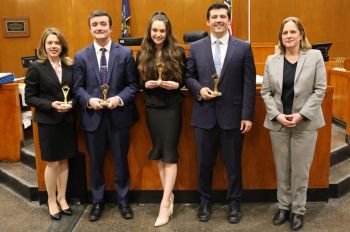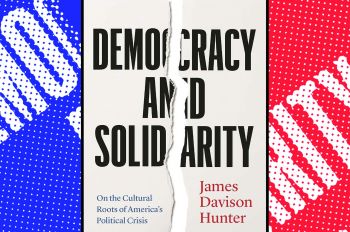Polar-Opposite Rhetorical Styles Make Teammates Regional Champs in NYC Bar Competition

One has a flair for the dramatic; the other, an unwavering adherence to case law and cold, hard fact. Together, the two Chicago-Kent College of Law students were able to integrate their complimentary styles well enough to take home the regional championship title of the most prestigious moot court competition of the year.
Jacob Skolnik ’22 and Zelpha Williams ‘22 won the title in the NYC Bar’s National Moot Court Competition. Skolnik also earned the best oralist award for his performance in the final round.
“Bringing home the nationals regional championship title is a fantastic accomplishment. I’m very proud of Zelpha and Jacob. They worked incredibly hard at crafting their arguments and put in countless hours of practice, all while helping our junior members prepare for the Rovner Competition,” says Cherish Keller, director of Chicago-Kent’s Ilana Diamond Rovner Program in Appellate Advocacy.
The competition’s arguments centered on a fictional United States Supreme Court case involving a transgender inmate who was attempting to get gender affirmation surgery to transition to a man.
The prison had a policy that denied such surgery, and the inmate sued, saying the blanket ban was a violation of their Eighth Amendment rights. The Eighth Amendment prohibits cruel and unusual punishment.
Additionally, the prisoner was represented pro bono by a private firm, but his attorney was hospitalized with an illness similar to COVID-19, which made him miss a filing deadline. The prisoner filed the case himself under the “prison mailbox rule,” which allows for filings to be dated when they’re placed in the prison mailbox, not when they’re received by a court.
The prison’s attorneys argued that because the prisoner was represented, the mailbox rule shouldn’t apply.
The teammates each focused on arguments that matched their style: Skolnik addressed the Eighth Amendment issue, where he thought he could get better leverage on judges’ heartstrings, while Williams tackled the hard, dry case law surrounding the prison mailbox issue.
“[Skolnik] is very engaging and dynamic, so it plays well for the constitutional issue, and my attention to detail plays well for the procedural issues, to find nitpicky arguments,” Williams says.
“I’m a very dramatic guy. Drama major,” Skolnik says. “I toe the line between being theatrical [and not], but I think it works to my advantage.”
When arguing for the inmate, Skolnik railed against the blanket ban. “[The prison] was hiding behind the ban without considering whether he needs the surgery. The plaintiff suffers from gender dysphoria; treatment of the condition is very individual. [The ban] doesn’t even provide an opportunity to sit at the table and discuss why it’s warranted.”
He pointed out that the plaintiff was on suicide watch, had lost weight and hair, and had told doctors he would kill himself if he didn’t get the surgery. His psychiatrist had backed his gender dysphoria diagnosis.
Skolnik admits he had a high bar to meet: that denying the inmate his surgery met a standard of “deliberate indifference,” set by the U.S. Supreme Court for extreme cases.
Thus, when representing the prison, Skolnik argued that “referring to policy is not indifference,” and there was not enough consensus in the medical community regarding gender affirmation surgery to meet the indifference standard.
“You have to show they’re objectively acting with malicious intent. If there’s a policy, you can’t prove it,” Skolnik says.
Still, every time the team argued for the prisoner, they won. The single time they lost was when representing the prison.
On the mailbox issue, Williams—when arguing for the plaintiff—pointed out that the rule was created out of equity, and that the plaintiff shouldn’t be harmed when they’re unrepresented.
When arguing for the prison, Williams said that just because one of the inmate’s lawyers was sick didn’t take away from the fact that he was still represented by an entire firm.
“Arguing Supreme Court cases is always very interesting and exciting, and I do enjoy procedural issues,” Williams says.
Sixteen teams competed in the competition. During their two preliminary rounds, Skolnik and Williams first lost against the University of Wisconsin Law School, then won against the University of Illinois Chicago School of Law. They went on to win the quarterfinals, semifinals and finals against Loyola University Chicago School of Law, DePaul University College of Law, and Marquette University Law School, respectively.
The duo will go on to compete in the NYC Bar’s national competition, to be held in the last week of January 2022.
Last year, the Chicago-Kent team of Hayden Dinges ’21 and Daniel Kfoury ’21 also advanced to the NYC Bar’s national competition after performing well in regionals.
Skolnik grew up in Glencoe, Illinois, and received bachelor’s degrees in drama and economics from Kenyon College in Ohio. He has clerked for Cook County Circuit Court justice Pamela Meyerson, and is currently clerking for Lane & Lane LLC, a personal injury firm in downtown Chicago.
Williams grew up in the Los Angeles suburb of Palos Verdes and received her bachelor’s degree in political science from Johns Hopkins University. She served as a judicial extern for Illinois Appellate Court Judge Mary Mikva, and currently clerks for Skarzynski Marick & Black LLP.



